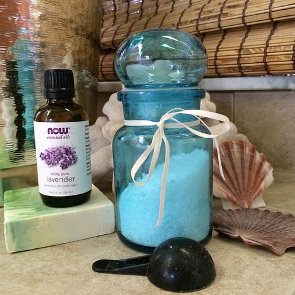5 Essential Oils to Add to Your Bath (and How to Do It Safely)
 Due to their high content of aromatic compounds, essential oils are widely used in aromatherapy for improving psychological and physical well-being. For example, they can be added to bath water to relieve stress and anxiety, relax sore muscles, and even prevent colds and other respiratory problems. Here are 5 essential oils that you can add to your bath.
Due to their high content of aromatic compounds, essential oils are widely used in aromatherapy for improving psychological and physical well-being. For example, they can be added to bath water to relieve stress and anxiety, relax sore muscles, and even prevent colds and other respiratory problems. Here are 5 essential oils that you can add to your bath.Lavender oil. Lavender oil is distilled from the flower spikes of English lavender (Lavandula angustifolia) and some other species of lavender. It is valued in aromatherapy thanks to its ability to reduce emotional stress and anxiety, improve sleep and brain function, and alleviate headaches. If you have insomnia, adding some lavender oil to bath water may be one of the most effective ways to cope with it without resorting to medication.
Rose oil. Rose oil is extracted from the petals of various species of rose (primarily Rosa damascena – the damask rose, and Rosa centifolia – the cabbage rose) through steam distillation. Its aromatherapy benefits include antidepressant, aphrodisiac, and antispasmodic properties. In addition, rose oil takes good care of the skin. It is suitable for all skin types, including dry and sensitive skin.
Chamomile oil. There are many chamomile varieties but only two are used to extract essential oil, Roman (Chamaemelum nobile) and German (Chamomilla recutita). Chamomile oil is considered to be one of the mildest essential oils. It soothes irritated skin, relieves some inflammatory skin conditions (such as psoriasis and eczema), reduces muscle tension, and helps relax and forget your troubles before bed.
Eucalyptus oil. Eucalyptus essential oil is considered to be one of the best antibacterial oils. It is effective for treating a number of respiratory problems including sore throat, cough, running nose, cold, and others. However, you should keep in mind that you must not take hot baths when you have fever. If you want to have a bath with eucalyptus oil to reduce a fever and make breathing easier, the only appropriate temperature is lukewarm.
Frankincense oil. This essential oil is produced by steam distillation of the aromatic resin obtained from the trees of the genus Boswellia. It has a balsamic, spicy fragrance with a conifer-like undertone. Frankincense oil helps reduce stress and get rid of negative emotions, boosts the immune system, improves memory, reduces symptoms associated with premenstrual syndrome and menopause, and prevents premature skin aging.
How to Use Essential Oils in the Bath Safely
You can’t just put pure essential oils into your bath water. Essential oils are not water soluble, and instead of mixing with water, they just float on the surface. When you climb into the tub, tiny drops of essential oil can adhere to your skin and cause irritation, itching and even chemical burn. So what is the safe way to use essential oils in a bath?
To protect your skin and increase the effectiveness of essential oils, you need to mix them with a substance that will act as an emulsifier and prevent the oils from touching your skin undiluted. The substances that you can use include:
- Carrier oil such as jojoba oil, coconut oil, etc. (5 drops of essential oil per 1 tbsp of carrier oil).
- Liquid soap or shower gel (5 drops of essential oil per 1 tbsp of soap or gel).
- Bath salt and soap/shower gel/carrier oil (5 drops of essential oil per 1–2 oz of bath salt and 2 tbsp of carrier oil, shower gel or liquid soap).
Finally, you can simply use bath salts infused with essential oils. They have all the benefits of both essential oils and salt, and don’t require you to do anything beyond dissolving them in the bath water, relaxing and enjoying the scent.
Breadcrumbs
Filters
- Body
Tags
Related Articles
- How to Wash Your Hair, 5 Non-Comedogenic Oils for Skin Care, 4 Benefits and Uses of Tea Tree Oil for Your Skin, 8 Amazing Benefits of Baobab Oil for Your Skin and Hair